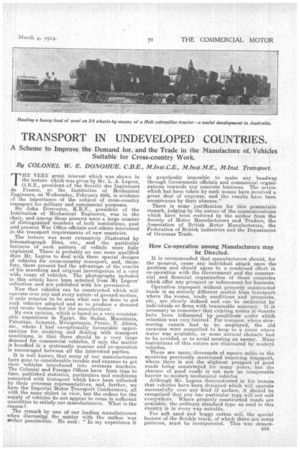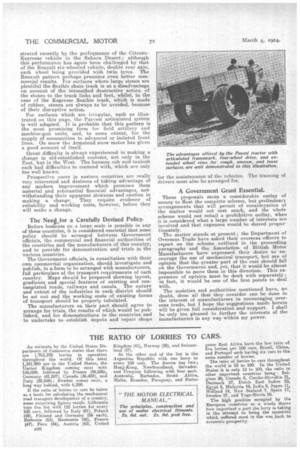TRANSPORT IN UNDEVELOPED COUNTRIES.
Page 9

Page 10

If you've noticed an error in this article please click here to report it so we can fix it.
A Scheme to Improve the Demand for, and the Trade in the Manufacture of, Vehicles Suitable for Cross-country Work,
By COLONEL W. E. DONOHUE, C.B,E., M.Inst.C.E., M.Inst.M.E., MAW, Transport.
THE VERY great interest which was shown in the lecture which was given by Mr. L. A. Legros,
0.B.E., president of the Soci4te des Ingenieurs de France, at . the Institution of Mechanical Engineers, on Wednesday, February 20th, is evidence of the importance of the subject of cross-country transport for military and cpmmercial purposes. Sir John Dewrance, K.B.E., president. of the Institution of Mechanical Engineers, was in the chair, and among those present were a large number of distinguished members of both institutiims, past and present War Office officials and others interested in the transport requirements of new countries.
The lecture was most extensively illustrated by kinematograph films, etc., and the particular features of each pattern of vehicle were fully explained. There is probably no one more qualified than Mr. Legros to deal with these special designs of vehicles for cross-country transport, and, there fore, those present had the advantage of the results of his searching and original investigation of a very
wide range of vehicles. The photographs included in this article have been selected from Mr Legros' collection and are published with his permission.
Now that vehicles can be constructed which will operate over any and every nature of ground surface, it only remains to be seen what can be done to get such vehicles adopted and so to produce a demand and create business for the manufacturer.
My own opinion, which is based on a very considerable experience in Egypt, the Sudan, Macedonia, Palestine, Armenia, Mesopotamia, Persia, E. Africa, etc., where I had exceptionally favourable opportunities for studying and dealing with transport conditions, is that there should be a very large demand for commercial vehicles, if only the matter is handled in a systematic manner and co-operation is encouraged between all the. interested parties. It is well known that many of our manufacturers have gone to considerable trouble and expense to get their vehicles introduced into overseas markets.
The Colonial and Foreign Offices have from time to time, published statistics, particulars and conditions connected with transport which have been collected by their overseas representatives, and, further, we have the Imperial Motor Transport Conferences, all with the same object in view, but the orders for the supply of vehicles do not appear to come in sufficient quantities to satisfy our manufacturers. What is the reason?
The remark by one of our leading manufacturers when discussing the matter with the author was rather pessimistic. He said: "In my experience it is practically imposible to make any headway through Government officials and commercial organizations towards any concrete business. The action which has been taken by such means have involved a great deal of expense and the results have been conspicuous by their alAence."
There is some justification for this pessimistic remark, judging by the nature of the cpnimunications which have been received by the author from the Society of Motor Manufacturers and Traders, the Association of British Motor Manufacturers, the Federation of British Industries and the Department of Overseas Trade.
How -Co-operation among Manufacturers may be Directed.
It is recommended that manufacturers should, for the moment, cease any individual attack upon the problem and should agree to a combined effort in co-operation with the Government and the commercial and financial organization of those countries which offer any prospect or inducement for business.
Operative transport without properly constructed roads is an entirely different matter from transport where the routes, trade conditions and prospects, etc., are, clearly defined and can be estimated by individuals or: firms with 'reasonable accuracy. It i3 necessary to remember that 'existing routes in deserts' haire been influenced by condition's ander which selection. was veryAimited. For instance, where slowmoving camels had to be embloyed, the old caravans were compelled to keep to a route where water was available, or some natural obstacle had to be avoided, or to avoid meeting an enemy. Many restrictions of this nature are eliminated by modern vehicles.
There are many, thousands of square miles in the countries previously mentioned requiring transport, where there is not the slightest prospect of good roads being constructed for many years, but the absence of good zoads is not now an insuperable barrier to Modern mechanical vehicles.
Although Mr. Legros demonstrated in his lecture that vehicles have been designed which will operate successfully over any kind of surface, it should be recognized that any one particular type will not suit everywhere. Where properly constructed roads are available, the ordinary standard type as used in this country is in every way suitable.
For soft sand and boggy cotton soil, the special feature of the flexible track, of which there are Many patterns, must be incorporated. This was demonB25 i rmance of the Citroen
Kegresse vehicle n the Sal-Cara Desert ; although this performance has again been challenged by that of the Renault six-wheeled vehicle, double rear axle, each wheel being provided with twin tyres. The Renault pattern perhaps promises even better commercial results. For surfaces where large stones are plentiful the flexible chain track is at a disadvantage on account of the intensified destructive action of the stones to the track links and feet, whilst, in the case of the Kegresse flexible track, which is made of rubber, stones are always to be avoided, because of their disruptive action.
For surfaces which are irregular, such as illustrated on this page, the Parvesi articulated system is well adapted. It is probable that this pattern is the most promising form for field artillery and machine-gun units, and, to some extent, for the supply of ammunition to advanced or isolated front lines. On snow the Armstead snow motor has given a good account of itself.
Great difficulty is always experienced in making a change in old-established customs, not only in the East, but in the West. The hansom cab and taxicab each had difficulties to contend with, which are only too well known.
Prospective users in eastern countries are really very interested and desirous of taking advantage of any modern improvement which promises them material and substantial financial advantages, notwithstanding their apparent slowness and caution in making a change. They require evidence of reliability and working costs, however, before they will make a change.
The Neepor a Carefully Devised Policy.
Before business on a large scale is possible in any of these countries, it is considered essential that some policy should be arranged between Government officials, the commercial and financial authorities of the countries and the manufacturers of this country, and to provide for demonstration and trials in the various countries.
The Government officials in consultation with their own commercial organization, should investigate and publish, in a form to be arranged with manufacturers, full particulars of the transport requirements of each country. Maps should be prepared showing layout, gradients and special features of existing and contemplated roads, railways and canals. The nature and extent of the industries in each district should be set out and the working costs of existing forms of transport should be properly tabulated.
The manufacturers on their part should agree to arrange for trials, the results of which would be published, and for demonstrations in the countries and to undertake to establish depots and repair shops for the maintenance of the vehicles. The training of drivers must also be arranged for.
A Government Grant Essential.
These proposals mean a considerable outlay of money to float the complete scheme, but preliminary arrangements that will permit of consideration of the matter would not cost much, and the whole scheme would not entail a prohibitive outlay, when it is considered what a large number of interests are involved and that expenses would be shared proportionately.
The matter stands at present ; the Department of Overseas Trade have asked their overseas officers to report on the scheme outlined in the proceeding paragraphs and the Association of British Motor Manufacturers have expressed their desire to encourage the use of mechanical transport, but are of opinion that the greater part of the cost should fall on the Government and, yet, that it would be almost impossible to move them in this direction. This expression of opinion must be dealt with separately ; • in fact, it would be one of the .first points to deal with.
The societies and authorities mentioned have, no doubt, done all that they consider can be done in the interest of manufacturers in encouraging overseas trade, but I hope the suggestions made herein will be given full consideration and support. I shall be only too pleased to further the interests of the manufacturers in any way within my power.






























